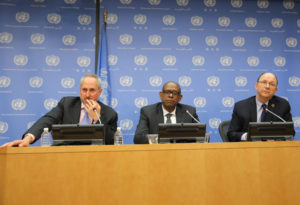The UN Spokesperson Who Must Know A Bit Of Everything
Respected media mogul Rupert Murdoch argues that a professional journalist is expected to be a ‘Jack of all trades, but a master of none.’ The reason he advances for this expectation is that journalists are supposed to handle content on a wide variety of issues in a bid to keep their constituencies informed regularly. In my recent internship at the United Nations Headquarters, I learnt that the Spokesperson to the Secretary-General of the United Nations (UN), Stephane Dujarric finds himself in a similar position. According to him, he must know a little bit about everything. The little bit of everything must be enough for him to provide concrete answers when shrewd journalists press him for them in the daily briefings which take place at noon. On a typical day, Dujarric responds to diverse issues raised such as questions ranging from the Syrian crisis, war on terrorism and governance problems in the Gambia, to what is happening on the small island of Haiti.
 UN Spokesperson Stephane Dujarric, actor and Sustainable Development Goals Advocate Forest
UN Spokesperson Stephane Dujarric, actor and Sustainable Development Goals Advocate Forest
[Whitaker and Assistant Secretary-General for Policy Coordination and Inter-Agency Affairs in the Department of Economic and Social Affairs Thomas Gass speak at a UN Press Briefing at United Nations on April 21, 2016 in New York City (April 20, 2016 – Source: Jemal Countess/Getty Images North America).]
Dujarric handles one of the most diverse press corps one would ever imagine from the 193 different member states of the UN. Presently, there about 200 journalists who are accredited to cover the UN at its headquarters. What makes handling these journalists difficult is that they all have different issues which they are interested in based on the media outlets and countries which they come from. To make their work easier, the UN provides office space for the some of the accredited journalists. Journalists file their stories and conduct interviews using these offices. The offices are repossessed when the UN notices that they are not being used. Journalists who conduct themselves in an undesirable manner have their accreditation revoked. Journalists can apply online for accreditation for as short a time as 3 to 6 months, which allows them to come to the UN Secretariat whenever they need to.
To adequately prepare for the daily briefings, Dujarric and his team meet every morning to share specific ideas on which they will gather information for that day. The team has a staff compliment of 6 people who are assigned to specific beats based on their skill sets and interests. After the information has been gathered, the team meets to run through it and package it all together in readiness for the daily briefing. For complex issues, Dujarric invites experts within the UN system to address the media and respond to subsequent questions. In fact, Dujarric encourages the different experts within the system to speak to the media whenever they can in their area(s) of focus.
During the times when the General Assembly is sitting and the Heads of States are around, there are no briefings for the first 3 days. This is because most of the journalists are so busy following around the different leaders trying to get the best possible stories. Unlike a news agency, the UN’s Department of Public Information, due to the fact that it speaks on behalf of different member states with different defined interests, does not quickly rush to issue a statement whenever something happens; the department studies the situation carefully before issuing a statement. Linked to this is careful wording, which is employed by the spokesperson. This is because the use of just one wrong word can have some seriously catastrophic consequences at the global level. That is why whenever Dujarric is unable to respond to a question, he simply says so. According to him, it is better to look stupid than to say something stupid which will have dire consequences. That is why he does not utter any off-the-cuff remarks. Further, his responses always must speak to the agreed upon principles of the UN.
If there is one thing which public relations experts agree on, it is that a good standing in the eyes of the media is very fragile. Just one incident can ruin the reputation, which the spokesperson has invested years of hard work to grow. That is why Dujarric is justified in maintaining a studious and measured approach when dealing with the media in his very sensitive UN job.